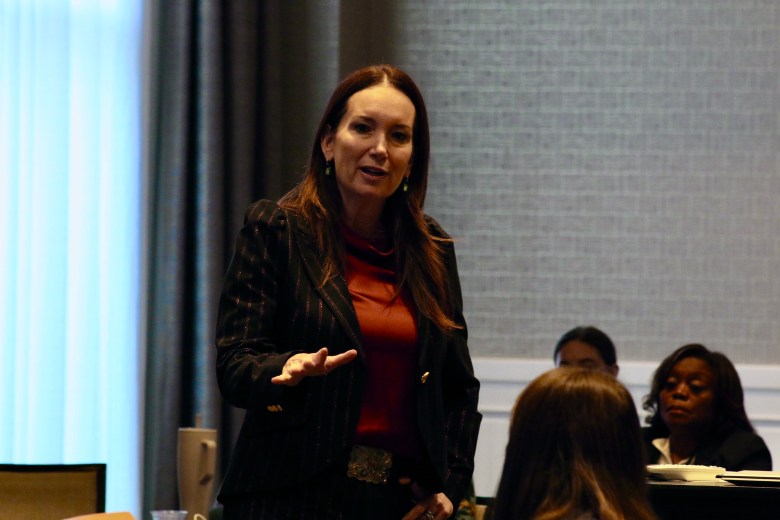Tariffs, a parasitic fly and devalued crops face ranchers and farmers across the country, but U.S. Agriculture Secretary Brooke Rollins reassured women in the business that federal officials are prioritizing their needs.
“There is nothing but good news for our industry,” Rollins said.
Ranching solutions, funding, economic trends and land conservation were among the topics discussed at this year’s Texas A&M AgriLife Extension Service’s Women in Agriculture conference on Sept. 10 in Fort Worth.
Rollins, a North Texas native, emphasized federal efforts to bolster agriculture that ranged from school lunches to farmland protections.
Nutrition, agriculture work in tandem
Opening up the agricultural market to younger farmers and families is top of mind, Rollins said.
The U.S. Department of Agriculture spends $400 a million a day on nutrition and food programs, funneling funds for school lunches and the Supplemental Nutrition Assistance Program, Rollins said.
Dedicating some of that funding into locally grown produce for schools is part of a move to “make America healthy again,” she added.
Rollins joined U.S. Department of Health and Human Services Secretary Robert F. Kennedy Jr. in a Sept. 9 meeting, where he unveiled the “Make America Healthy Again,” strategy. The document consists of 120 initiatives to address chronic disease in children fueled by poor nutrition and unhealthy diets.
The report includes strategies on improving agriculture and cropland.
“America’s farmers and ranchers are at the heart of the solution … to fight chronic disease and protect future generations,” said Rollins in a news release.
 Secretary of Agriculture Brooke Rollins spoke at the annual Women in Agriculture conference Sept. 10, 2025, hosted by the Texas A&M AgriLife Extension Service, at the SpringHill Suites hotel at the Fort Worth Stockyards in Fort Worth. (Nicole Lopez | Fort Worth Report)
Secretary of Agriculture Brooke Rollins spoke at the annual Women in Agriculture conference Sept. 10, 2025, hosted by the Texas A&M AgriLife Extension Service, at the SpringHill Suites hotel at the Fort Worth Stockyards in Fort Worth. (Nicole Lopez | Fort Worth Report)
Financial protections
The passage of the One Big Beautiful Bill Act was a “big win” for the Department of Agriculture as federal officials have struggled to pass a new “Farm Bill” under her administration, Rollins said.
The Farm Bill, formally known as the Agriculture Improvement Act of 2018, aimed to maintain prices for farmers and consumers, secure adequate food supply and protect farmland in response to historical economic and environmental hardship.
Passed in July, the One Big Beautiful Bill Act secured $66 billion in new spending for agriculture, expanded crop insurance coverage, increased commodity prices and created tax cuts for farmers.
“The largest investment in rural America in the history of our country was in that bill,” Rollins told the women at the conference.
Tariffs, foreign producers
The current economy is in the most dire state farmers have experienced in almost 50 years, Rollins said, citing decreased value in crops traded outside of the United States, including corn, wheat and soybean.
Trade conflict between the United States and China over tariffs on the crop trio is driving lower exports and fewer foreign market demands, according to a report from Reuters.
Additionally, Rollins wants to implement more national security into the agricultural workforce.
About 40 years ago, Chinese companies owned roughly 2,000 acres of farmland in the country, she said. Today, investors from China now own about 300,000 acres of American farmland, Rollins added.
Foreign companies operating on farmland creates challenges for the agriculture industry and national security, Rollins said. A new Texas law went into effect this month banning some foreign entities and individuals — including those from China — from certain land purchases.
Immediately following her panel, Rollins said she was on way to Washington, D.C., where she planned to speak with President Donald Trump on how to resolve issues on foreign trade.
New World screwworm
Federal leaders are on a $1 billion-facility that would contain the New World screwworm outbreak, Rollins said.
The New World screwworm is a parasite that attacks livestock, pets and wildlife by burrowing into the flesh of a living animal. Infestation by the fly is often deadly to animals, posing a threat to those in the agriculture and ranching industries.
Additionally, the Department of Agriculture announced a partnership Aug. 15 with several other federal agencies, including the U.S. Food and Drug Administration, prioritizing animal drug development, prevention and other technologies to combat the pest.
“President Trump is fully in support and understands the importance of protecting our livestock in America,” Rollins said.
Nicole Lopez is the environment reporter for the Fort Worth Report. Contact her at nicole.lopez@fortworthreport.org.
At the Fort Worth Report, news decisions are made independently of our board members and financial supporters. Read more about our editorial independence policy here.
Related
Fort Worth Report is certified by the Journalism Trust Initiative for adhering to standards for ethical journalism.
Republish This Story
Republishing is free for noncommercial entities. Commercial entities are prohibited without a licensing agreement. Contact us for details.
